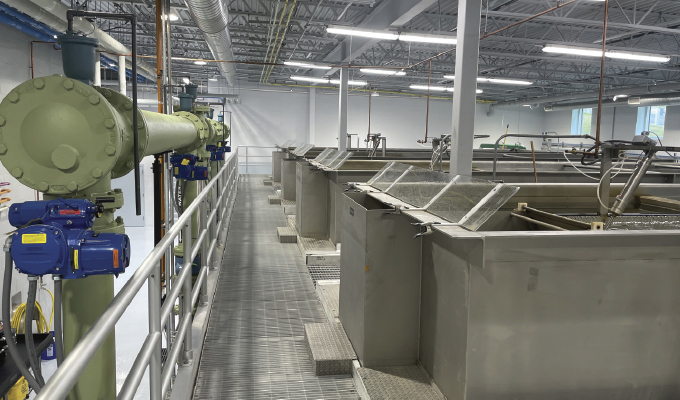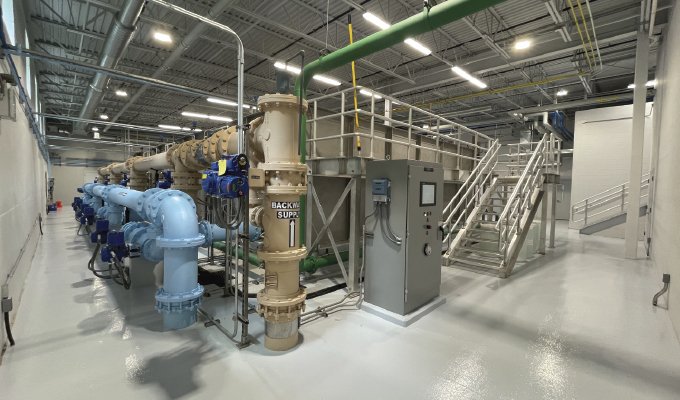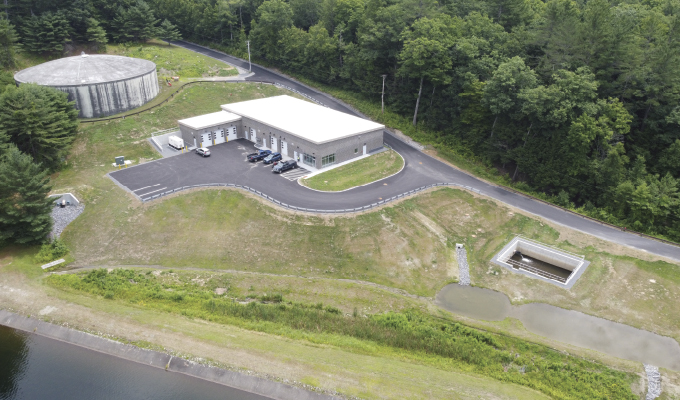In August of 2024, Kingsbury Companies, a Middlesex, Vermont-based heavy civil contracting firm, successfully completed major improvements to the Pleasant Valley Water Treatment Facility in Brattleboro, VT. The project involved six major undertakings: the demolition of the old plant; the construction of a state-of-the-art new water treatment facility built from the ground up; the expansion of filter units; upgrades to the Supervisory Control and Data Acquisition system and instrumentation; infrastructure enhancements; and underwater maintenance. As a result, the town of Brattleboro has greater capacity to serve the growing community with clean drinking water for decades to come.
The water treatment facility draws water from the Pleasant Valley Reservoir, which has provided drinking water to the Town of Brattleboro since 1920. The plant plays a crucial role in supplying an average of 1.0-1.5 million gallons of high-quality water daily from the reservoir. The project was initiated to replace an aging facility built in 1989, which had outlived its roughly two-decade expected lifespan. The town of Brattleboro began planning for the project in 2017, and construction broke ground in the summer of 2021.
MAINTAINING SERVICE
Throughout the construction of the new facility, the old plant needed to continue operating to maintain clean drinking water production at all times. This added an extra level of difficulty as the proposed new facility footprint was a mere 20 feet from the footprint of the existing plant, requiring a high level of coordination and sequencing to enable construction on the postage stamp site. Kingsbury used its 40 years of experience in contracting to ensure all parties involved, from the owner to vendors and its many key subcontractors, coordinated their efforts to ensure service was reliable and undisturbed for the customers. An outline of the old facility’s footprint is on site, just steps away from the entrance to the new facility.
There were nearly 40 subcontractors specializing in various disciplines such as concrete, electrical, HVAC, plumbing, sheet piling, masonry, steel erection, and more, who supported this project. To maintain operation of the old plant, the project required multiple coordinated shutdowns and overnight work to complete tie-ins to the existing system.

NEW AND IMPROVED
The new water treatment plant comes with a first-in-the-state water source HVAC system that uses no fossil fuels, but instead conditions the air via the drinking water source heat pump to heat and cool the facility. Not only is the new plant’s heating system self-sufficient, but two of the four filters were refurbished from the old plant. This saved the town money, and the plant blends state-of-the-art technology while staying mindful of the current and future economic and environmental impact to the town.
Further upgrades to the plant included a complete replacement of all instrumentation for the water treatment facility and raw water pump station buildings, along with the remote locations around town that are part of the water and wastewater system. A new cast-in-place concrete process-wastewater equalization tank was also constructed along with a buried precast concrete vault for process-wastewater flow control.
The existing raw water intake structure was also repaired. This required underwater work with divers. Some 1,200-linear feet of 24-in. pipe was installed to increase the contact time for manganese removal.
The new plant includes a three-bay garage allowing for indoor space for maintenance, along with a new storage room and a larger room for staff.
SUPPLY CHAIN
While maintaining operation of the old plant created real coordination effort, the impact of a slow supply chain, which began during the pandemic in 2020, was only exacerbated throughout the project timeline by events like the “Ever Given” Suez canal blockage in 2021 and the escalation of the War in Ukraine in 2022, which created scheduling and material supply challenges.
This project was also funded by the United States Government with funds granted through the EPA revolving loan funds, administered through the Vermont Water Investment Division. This meant that the project needed to be American Iron and Steel (AIS) compliant, only adding to the elusiveness of certain materials necessary to construct the project.
Like many other construction projects throughout the pandemic, there were longer lead times for electrical components, equipment, valves, motors, and more that delayed the end date of the project. Regardless of these many challenges, Kingsbury managed to deliver a state-of-the-art facility of the highest quality standards that prepares Brattleboro for the future and recognizes the town’s commitment to sustainability and innovation.

ADDITIONAL CHALLENGES
The sitework of the new facility involved deep excavation for the new foundations in addition to the new well, which is where the filtered water is pumped to the storage tank. The existing topography and the approximately 20-feet deep excavation required the complex design and installation of a shoring system. As excavation progressed, bedrock was found that didn’t allow the installation of sheet piles as originally designed. In order to minimize the project delays, Kingsbury (with its subcontractors and engineers) quickly redesigned and moved forward with a new shoring system that required drilling 8 feet deep into the bedrock to allow for the installation of 20- and 30-ft long casing and piping to support the sheet piles, along with a new “whale system” to support the shoring above ground.
The refurbishment of the two existing filters and installation at the new facility was also a challenge that required extensive planning and coordination. The approximately 20,000-lb. filter tanks had to be moved from the old facility to the new facility with the help of an 80,000-lb. excavator. Once the filters were brought to the access doors of the new building, they were put on rollers and slid into their final positions, making sure they aligned with the newly installed piping and manifolds.
Kingsbury will use lessons learned from these treatment facility improvements for future projects. Those lessons include the importance of carefully coordinating with the town and all contractors to avoid disruption in water treatment service and leveraging modern technologies that lead to unique and innovative solutions.
for more information
Kingsbury Companies, LLC, is a leader in construction and infrastructure development. For more, visit www.kingsburyco.com.


